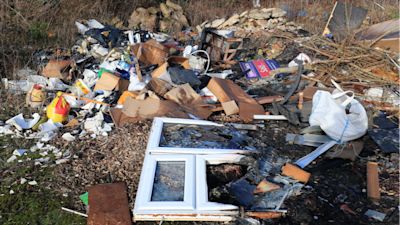Councils in England dealt with nearly 1m cases of fly-tipping in England - is your area the worst for illegal dumping?

Video report by ITV News Consumer Editor Chris Choi
Fly-tipping in the year before coronavirus hit increased with councils dealing with nearly one million cases up to March 2020, official data shows.
Overall, the data for England shows there were 976,000 incidents of illegal waste dumping dealt with by local authorities in 2019/20, up 2% on the previous year.
London and the North East had the highest amount of incidences recorded with the South West having the lowest.
Just under two thirds (65%) of fly-tips involved household waste with a total of 632,000 recorded in 2019/20 - an increase of 7%.
The most common place for fly-tipping to occur was on highways (pavements androads), which accounted for more than two-fifths (43%) of total incidents in 2019/20
However, illegal dumping in rural communities has also increased with district councils warning of a "fly-tipping farm-aggedon".
The District Council Network (DCN) of 187 local authorities across England said its members had seen a major increase in incidents on farmland in recent years – and it had become a growing target for fly-tippers in the past year.
Fly-tipping on agricultural land in district council areas increased 80% from 888 in 2012/13 to 1,600 in 2019/20, while total incidents in districts rose from 173,000 to 209,000 for the same period, the figures show.
Dan Humphreys, the DCN’s lead member for enhancing quality of life, said: “We are seeing this becoming more and more of an issue in the countryside, with rural communities experiencing what is tantamount to a fly-tipping farm-aggedon.”
He called for government funding certainty to help district councils “wage war on fly-tippers”, and for sentencing guidelines to be reviewed so courts can be tougher on those found guilty of the more serious offences.
The figures do not show the impact on fly-tipping of the pandemic, which saw municipal dumps closed, disrupted some waste collections and forced people to stay home where many turned to spring cleaning, gardening and DIY.
The 2019/20 period covered by the figures published by the Environment Department (Defra) only includes the first week of the first lockdown, introduced on March 23 last year.
But surveying of councils by the Association of Directors of Environment, Economy, Planning and Transport (Adept) in the past year show many have seen higher levels of fly-tipping.
Household rubbish accounts for nearly two-thirds (65%) of the waste illegally dumped with the most common size of fly-tips, accounting for more than one-third (34%) of cases, is a small van-load of illegally tipped rubbish, followed by incidents the size of a car boot-load or less (28%).
There were 33,000 incidents where the rubbish dumped was the size of a tipper lorry-load or larger, down 8% on the previous year, but still costing £10.9 million for councils to clean up.
Enforcement actions, including fixed-penalty notices, were down slightly last year on 2018/19, but the number of court fines handed out was up 30% in a year, and the total value increased 7% to £1.17 million, the figures show.
Most of the dumped items recorded in the figures were classed as "other unidentified", but out of those that were, white goods, construction materials and green waste were the most popular items to be fly-tipped.
Environment minister Rebecca Pow said: “Fly-tipping is completely unacceptable and these cynical offenders need to know that councils are taking increasing action and that they face on-the-spot fines of £400 or up to five years in prison if convicted in court.”
She said the number of fixed-penalty notices issued had increased by a third since 2016 and prosecutions had doubled in the same period.
“We are committed to tackling waste crime even further, but there is more that we must all do,” she said.
“Everyone has a legal duty of care when handling waste, and all householders and businesses must ensure that they pass their waste to licensed carriers, as failure to do so could result in a £400 fine.”